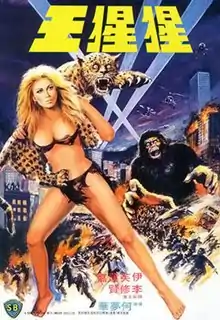The Mighty Peking Man
The Mighty Peking Man (猩猩王) (Mandarin: Xīngxing Wáng – which translates to "Gorilla King" in English) is a 1977 giant monster film produced by Shaw Brothers Studio to capitalize on the craze surrounding the 1976 remake of King Kong. The film was originally released in 1980 in the United States, with an English dubbing, as Goliathon [5]
| Utam: King of the Orangutans (The Mighty Peking Man) | |
|---|---|
 Theatrical release poster | |
| Directed by | Ho Meng-hua |
| Written by | Kuang Ni |
| Produced by | Runme Shaw |
| Starring | Danny Lee Evelyne Kraft Hsiao Yao Ku Feng Lin Wei-tu |
| Cinematography | Tsao Hui-chi Wu Cho-hua |
| Edited by | Chiang Hsing-Lung Pepita Fairfax Thom Noble |
| Music by | Frankie Chan De Wolfe |
Production company | |
| Distributed by | Shaw Brothers Studio |
Release date |
|
Running time | 90 minutes |
| Country | Hong Kong |
| Language | Mandarin |
| Budget | HKD 6,000,000($500,000[2]-$1,000,000 USD[3])(estimated) |
| Box office | $17,368[4](1999 North American re-release) |
The film was directed by Ho Meng Hua and produced by Runme Shaw; the special effects were directed by Sadamasa Arikawa, with Koichi Kawakita as assistant FX director, who would move on to the Heisei Godzilla movies and the Heisei Mothra trilogy. It starred Danny Lee and Evelyne Kraft.
Plot
Lu Tiem reads in the newspaper that a giant footprint was found in the Indian part of the Himalayas. In a flashback, Utam the Mighty Peking Man (aka Goliathon) is seen destroying buildings, throwing rocks, and causing an earthquake-like rampage.
A party from Hong Kong, headed by Johnny is exploring the Indian side of the Himalayan mountains. They ask the Himalayan people about what happened the precedent year and meet other animal species (bears, monkeys, etc) and fight against elephants who are the "bodyguards" of Utam. Johnny and his partners manage to take Utam to Hong Kong,
Cast
- Danny Lee – Johnny Feng
- Evelyne Kraft – Samantha
- Katherine Murphy as Young Samantha
- Ku Feng – Lu Tien
- Lin Wei-tu – David Chen
- Norman Chui – Ah Lung
- Wu Hang-sheng – Ah Pi
- Hsiao Yao – Huang Tsui-Hua
- Chen Ping – Lin Chang
- Ted Thomas – Commissioner Theodore
- Steve Nicholson – Commissioner's aide
- Corey Yuen (uncredited)
- Keizo Murase – Utam (uncredited)
Production
The Mighty Peking Man had a budget of six million Hong Kong dollars for the Shaw Bros. studio.[1] The film took over a year to complete and was shot in Mysore, India.[1] the miniatures were done by Cosmo Productions, everything from model cars, trucks, helicopters and buildings done by Murase himself. the design of the character Utam was made by brown fur originally white hair in the prototype, several scenes from man-in a suit and animatronic mask, close up puppet shots of the head, life size hands, legs. the climax filming the scene in top the Jardine House on the roof where Utam blown up by between takes, were poured by gas and was dangerous, and a stuffed dummy crashed the General Post office burns the set.
Release
The Mighty Peking Man was distributed by Shaw Bros. in Hong Kong.[1] Also in United States both released from March 19, 1980, by World Northal Pictures and re-released in April 23, 1999, by Rolling Thunder Pictures.
Reception
Variety reviewed a 100-minute long Cantonese-language version of the film stating it was an "interesting if not unique Hongkong-made escapist entertainment for the inquisitive middle-of-the-roaders audience of other countries." and "it is high camp, Chinese style and for this reason it just might make it in less demanding markets."[1]
In retrospective reviews, Roger Ebert gave the film three stars out of a possible four in the Chicago Sun-Times, and, incidentally, actually upgraded his rating for the thematically similar Infra-Man:
"Mighty Peking Man is very funny, although a shade off the high mark of Infra-Man, which was made a year earlier, and is my favourite Hong Kong monster film. Both were produced by the legendary Runme Shaw, who, having tasted greatness, obviously hoped to repeat. I find to my astonishment that I gave Infra-Man only two and a half stars when I reviewed it. That was 22 years ago, but a fellow will remember a lot of things you wouldn't think he'd remember. I'll bet a month hasn't gone by since that I haven't thought of that film. I am awarding Mighty Peking Man three stars, for general goofiness and a certain level of insane genius, but I cannot in good conscience rate it higher than Infra-Man. So, in answer to those correspondents who ask if I have ever changed a rating on a movie: Yes, Infra-Man moves up to three stars.[6]
Footnotes
- Willis 1985, p. 321: "Review is of a Cantonese-language 100 minute version viewed in Hong Kong on April 10, 1977"
- "Evelyne Kraft: Swedish Jungle Girl". themastercylinder.com. Retrieved 23 November 2020.
- Siddique, Sophia; Raphael, Raphael (24 February 2017). Transnational Horror Cinema:Bodies of Excess and the Global Grotesque. Springer. ISBN 978-1-137-58417-5. Retrieved 10 May 2020 – via books.google.com.
- "The Mighty Peking Man". boxofficemojo.com. Retrieved 4 May 2020.
- "Mighty Peking Man-From the Grindhouse Cinema Database". grindhousedatabase.com. Retrieved 10 May 2020.
- Ebert, Roger (30 April 1999). "Mighty Peking Man". rogerebert.com. Retrieved 31 January 2016.
References
- Willis, Donald, ed. (1985). Variety's Complete Science Fiction Reviews. Garland Publishing Inc. ISBN 978-0-8240-6263-7.